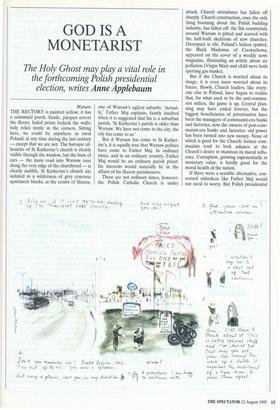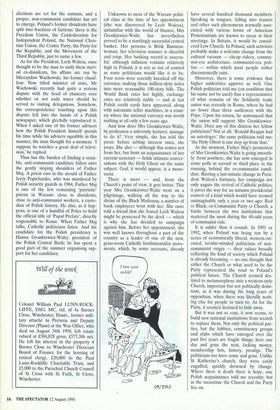GOD IS A MONETARIST
The Holy Ghost may play a vital role in the forthcoming Polish presidential
election, writes Anne Applebaum Warsaw THE RECTORY is painted yellow; it has a columned porch. Inside, parquet covers the floors; faded prints bedeck the walls; holy relics nestle in the corners. Sitting here, we could be anywhere in rural Poland, at any time during the last century — except that we are not. The baroque sil- houette of St Katherine's church is clearly visible through the window, but the hum of cars — the main road into Warsaw runs along the very edge of the churchyard — is clearly audible. St Katherine's church sits isolated in a wilderness of grey concrete apartment blocks, at the centre of Sluzew, one of Warsaw's ugliest suburbs. `Actual- ly,' Father Maj explains, faintly insulted when it is suggested that his is a suburban parish, `St Katherine's parish is older than Warsaw. We have not come to the city, the city has come to us.'
But if Warsaw has come to St Kather- ine's, it is equally true that Warsaw politics have come to Father Maj. In ordinary times, and in an ordinary country, Father Maj would be an ordinary parish priest: his interests would naturally lie in the affairs of his Sluzew parishioners.
These are not ordinary times, however: the Polish Catholic Church is under attack. Church attendance has fallen off sharply. Church construction, once the only thing booming about the Polish building industry, has fallen off: the flat countryside around Warsaw is pitted and scarred with the half-built skeletons of new churches. Disrespect is rife. Poland's holiest symbol, the Black Madonna of Czestochowa, appeared on the cover of a weekly news magazine, illustrating an article about air pollution (Virgin Mary and child were both sporting gas masks).
But if the Church is worried about its image, it is even more worried about its future. Slowly, Church leaders, like every- one else in Poland, have begun to realise that, for what used to be the anti-commu- nist milieu, the game is up. Central plan- ning may have ended forever, but the biggest beneficiaries of privatisation have been the managers of communist-era banks and factories, now the owners of post-com- munist-era banks and factories: old power has been turned into new money. None of which is good for the Church: former com- munists tend to look askance at the Church's desire to maintain its moral influ- ence. Corruption, growing exponentially in monetary value, is hardly good for the moral health of the nation.
If there were a sensible alternative, con- cerned onlookers like Father Maj would not need to worry. But Polish presidential elections are set for the autumn, and a proper, non-communist candidate has yet to emerge. Poland's former dissidents have split into fractions of factions: there is the Freedom Union, the Confederation for Independent Poland, the National Chris- tian Union, the Centre Party, the Party for the Republic, and the Movement of the Third Republic, just to name a few.
As for the President, Lech Walesa, once thought to be the man to unify these myri- ad ex-dissidents, his affairs are run by Mieczyslaw Wachowski, his former chauf- feur. Now titled minister of state, Mr Wachowski recently had quite a serious dispute with the head of chancery over whether or not soda water should be served to visiting delegations. Somehow, the correspondence touching upon this dispute fell into the hands of a Polish newspaper, which gleefully reproduced it. When I asked one of his former advisers how the Polish President himself spends his time while his advisers squabble in this manner, the man thought for a moment. 'I suppose he watches a great deal of televi- sion,' he replied.
Thus has the burden of finding a sensi- ble, anti-communist candidate fallen onto the gently sloping shoulders of Father Maj. A priest cast in the mould of Father Jerzy Popieluszko, who was murdered by Polish security guards in 1984, Father Maj is one of the few remaining 'patriotic' priests in Warsaw: close to dissidents, close to anti-communist workers, a custo- dian of Polish history. He also, as it hap- pens, is one of a handful of Poles to hold the official title of 'Papal Prelate', directly responsible to Rome. When Father Maj talks, Catholic politicians listen. And his candidate for the Polish presidency is Hanna Gronkiewicz-Waltz, president of the Polish Central Bank; he has spent a good part of the summer organising sup- port for her candidacy. Unknown to most of the Warsaw politi- cal class at the time of her appointment (she was discovered by Lech Walesa), unfamiliar with the world of finance, Mrs Gronkiewicz-Waltz has nevertheless proved to be a startlingly successful central banker. Her persona is Brisk Business- woman; her television manner is cheerful and crisp. Her banking record is success- ful: although inflation remains relatively high in Poland, it is not as out of control as some politicians would like it to be. Four zeros were recently knocked off the currency, making those million-zloty notes into more reasonable 100-zloty bills. The World Bank rates her highly, exchange rates are relatively stable — and at last Polish credit cards have appeared, along with automatic teller machines, in a coun- try where the national currency was worth nothing at all only a few years ago.
And how does Mrs Gronkiewicz-Waltz, by profession a university lecturer, manage to do it? Very simple, she has told the press: before setting interest rates, she prays. She also — although this comes not from her, but from an acquaintance of her current secretary — holds intimate conver- sations with the Holy Ghost on the same subject. God, it would appear, is a mone- tarist.
There is more — and, from the Church's point of view, it gets better. This year Mrs Gronkiewicz-Waltz went on a pilgrimage, walking all the way to the shrine of the Black Madonna; a number of bank employees went with her. She once told a friend that she feared Lech Walesa might be possessed by the devil — which is why she has decided to campaign against him. Before her appointment, she was well known throughout a part of the country as a leader of one of the new, grass-roots Catholic fundamentalist move- ments, which, by some accounts, already have several hundred thousand members. Speaking in tongues, falling into trances and other such phenomena normally asso- ciated with various forms of American Protestantism are known to occur at their meetings. In Britain, it would be consid- ered Low Church. In Poland, such activities probably make a welcome change from the cultural vacuum — cheap videos, commu- nist-era architecture, communist-era poli- tics — within which most people rather discontentedly exist.
Moreover, there is some evidence that higher authorities approve as well. One Polish politician told me (on condition that his name not be used) that a representative of what remains of the Solidarity trade union was recently in Rome, where he had no fewer than three audiences with the Pope. Upon his return, he announced that the union will support Mrs Gronkiewicz- Waltz. Does any of this distress her fellow politicians? Not at all. 'Ronald Reagan had an astrologer,' the same politician told me; `the Holy Ghost is one step up from that.'
At the moment, Father Maj's promotion of Mrs Gronkiewicz-Waltz is going smooth- ly: from nowhere, she has now emerged in some polls in second or third place in the running, behind the ex-communist candi- date. Barring a last-minute change in Presi- dent Walesa's fortunes, her campaign not only augurs the revival of Catholic politics, it paves the way for an autumn presidential contest of a kind which would have seemed unimaginable only a year or two ago: Red vs Black, ex-Communist Party vs Church, a battle between the two institutions that mattered the most during the 40-odd years of communist rule.
It is odder than it sounds. In 1991 or 1992, when Poland was being run by a series of economically liberal, western-ori- ented, secular-minded politicians of non- communist origin — their values broadly reflecting the kind of society which Poland is already becoming — no one thought that either the Church or what used to be the Party represented the road to Poland's political future. The Church seemed des- tined to metamorphose into a western-style Church, important but not politically domi- nant, as it was during the long years of opposition, when there was literally noth- ing else for people to turn to. As for the Party, it seemed destined to fade away.
But it was not so easy, it now seems, to build new national institutions from scratch to replace them. Not only the political par- ties, but the lobbies, constituency groups and clubs which have emerged over the past five years are fragile things, here one day and gone the next, lacking money, membership lists, history, prestige. The politicians too have come and gone. Unlike St Katherine's church, they were easily engulfed, quickly drowned by change.
Where there is death there is hope, one Polish acquaintance told me recently; but in the meantime the Church and the Party live on.



















































 Previous page
Previous page